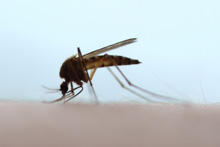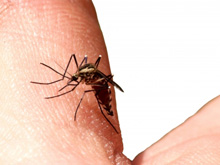Warning: “Worst Mosquito Season in Two Decades" Predicted -- What You can Do to Prevent West Nile Virus and Other Mosquito-Related Risks
by www.SixWise.com
Mosquito season is upon us in the United States, which means your next picnic, barbecue or walk around the neighborhood may be accompanied by some unwanted pests.
Mosquito bites are, of course, itchy and sometimes a bit painful, but mosquitoes' real risk comes from their ability to transmit disease.
|

Due to an abundance of wet weather, certain areas of the United States are predicting this may be the worst mosquito season in two decades!
|
In the United States, mosquitoes can carry West Nile Virus (WNV), an infectious disease that first appeared in the United States in 1999 and since then has appeared in all contiguous 48 states. About one in 150 people bitten will develop a serious case with a few who can or will die.
When bitten by an infected mosquito (mosquitoes often become infected from biting infected birds), West Nile Virus can enter your bloodstream and multiply, where it then moves on to your brain, crossing the blood-brain barrier and causing brain tissues to become inflamed.
Most cases of WNV (about 80 percent) are not serious and most who become sick recover fully. However, in about 1 percent of cases or less a serious, life-threatening illness can develop. In severe cases, WNV symptoms include headache, high fever, stiff neck, disorientation, muscle weakness, tremors and permanent paralysis, so if you notice these symptoms about two to 15 days after being bit by a mosquito, see a health care practitioner right away.
People over 50 and those with weakened immune systems are at highest risk of developing a serious case of West Nile Virus.
Further, in another 20 percent of those who become infected, symptoms such as fever, headache, and body aches, nausea, vomiting, and sometimes swollen lymph glands or a skin rash on the chest, stomach and back may develop. These symptoms may last anywhere from a few days to several weeks.
|
Repel Mosquitoes Naturally … NOT with chemically DANGEROUS DEET!

Lice and Tick B Gone works amazingly well for repelling mosquitoes too, if not better than Hazardous DEET products!
 The active chemical ingredient in most insect repellents available in the United States -- DEET -- may be harmful to your health. To repel insects like mosquitoes naturally, try Lice B Gone, the 100% safe, pesticide-free lice shampoo that doubles as an excellent insect repellant. The active chemical ingredient in most insect repellents available in the United States -- DEET -- may be harmful to your health. To repel insects like mosquitoes naturally, try Lice B Gone, the 100% safe, pesticide-free lice shampoo that doubles as an excellent insect repellant.
You can safely spray Lice B Gone on your skin or mist outdoor areas to keep mosquitoes, flies, gnats, and other pests away for up to three hours!
Learn More About
Lice B Gone Now!
|
2009 West Nile Virus Activity
To see whether any cases of West Nile Virus have occurred in your area, you can view the U.S. Centers for Disease Control and Prevention’s (CDC) map of West Nile Virus activity in the United States.
You’re most likely to get WNV when mosquito populations are most active, which is during the warm, summer months in the United States.
Further, this year in particular could be a particularly bad mosquito season for many parts of the United States, due to recent wet weather. The Utah Department of Health, for instance, is predicting the worst mosquito season in 20 years and warning that five mosquito pools in the state have tested positive for the West Nile Virus.
Why, and How, do Mosquitoes Bite?
Mosquitoes can be found all over the world -- except in Antarctica -- but because they must have standing water to lay eggs, they're often found around ponds, swampy areas, stream edges, drainage areas and other damp, wet areas.
Why do they bite? Mosquitoes bite to feed. After landing on your skin, they insert their sharp, thin mouthpart called a proboscis into you and suck your blood into their abdomen. Only female mosquitoes bite people (males feed on plant juices), and their saliva contains anticoagulant proteins that prevent your blood from clotting and make it easier for them to feed.
After a mosquito bites you, some saliva remains in the wound, causing an immune response to occur. The bite will typically swell and itch until your immune system can break down the saliva. Again, there is also the risk that mosquitoes can transmit West Nile Virus and, though not common in the United States, dengue fever, yellow fever and malaria can also be transmitted by mosquitoes.
However, if ever traveling abroad consider packing with you or your loved one some safe highly effective natural DEET-free INSECT and Mosquito Repellant like Lice-B-Gone.
How to Reduce Your Risk of Being Bitten
If you're going to spend time outdoors, wearing long pants, socks and long sleeves is one of the best ways to prevent mosquito bites. However, mosquitoes can bite through thin material, so you may want to spray a chemical-free (look for a non-toxic variety that doesn't contain DEET) insect repellant on the outside of your clothes.
It’s a good idea to apply a chemical-free insect repellant to any exposed skin as well. One such safe repellant is Lice B Gone -- it's a lice shampoo that contains no harmful pesticides or irritating chemicals that doubles as a non-toxic insect repellant. Some people also spray it outside to keep pests away when they're entertaining.
You can safely spray Lice B Gone on your skin or mist outdoor areas to keep mosquitoes, flies, gnats, and other pests away for up to three hours!
Dusk and dawn are peak mosquito hours, so take extra precautions during these times.
Since mosquitoes lay eggs in standing water, you can reduce the number of mosquitoes around your home by eliminating any standing water (flower pots, birdbaths, pet water dishes, barrels and more can all be culprits). Meanwhile, keep mosquitoes out of your home by installing tight-fitting screens into all your windows and doors (and repairing any holes in existing ones).
Recommended Reading
The Deadliest Animal on Earth: A Short and Important Overview
How to Most Effectively Keep Flies, Wasps, Gnats and Other Pests Away from Your Picnic This Summer
Sources
The Salt Lake Tribune June 11, 2009
MayoClinic.com West Nile Virus
U.S. Centers for Disease Control and Prevention: West Nile -- Virus What You Need to Know